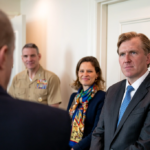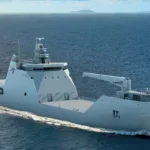NATO's secretary general says the alliance has no plans to move Allied Command Transformation (ACT), which will stay in Norfolk, Va., even as the U.S. Defense Department plans to shutter its close partner and neighbor, U.S. Joint Forces Command (JFCOM). "I do believe it makes sense to have a NATO headquarters also in the United States," NATO Secretary General Anders Fogh Rasmussen recently told the Defense Writers Group. " I expect ACT to continue to be located in Norfolk." U.S.…
Recommended
Trending
Congress Updates
Wicker Wants Legislation On DoD’s Equity Investments In Minerals Supply Chain
Legislation regarding equity investments by the Defense Department in critical mineral supply chains is needed to strengthen the larger defense industrial base and demonstrate to the “free market” that the […]
“Not Sure How They Get To Where They Wanna Be,” Calvert Says of $1.5 Trillion Defense Topline Proposal
As the federal government enters a third week of tardiness in a fiscal 2027 budget release, a big question is how the Pentagon will be able to spend $500 billion […]
Path Uncertain For $1.5 Trillion FY ‘27 Defense Topline After Trump Casts Doubt On Second Reconciliation Bill
The path to achieve the White House’s call for a $1.5 trillion defense topline in 2027 appears murkier now after President Donald Trump has cast doubt on the prospects of […]
Senate Budget Dems Push For Defense Reconciliation Spending Details, Cite ‘Slush Fund’ Concerns
Democrats on the Senate Budget Committee have raised “significant concern” with the Pentagon’s move to classify reconciliation spending plans, urging the department to provide more public details on how the […]
Job Feed
-
Cleared Senior/Principal R&D Systems Engineer
Component and Material Evaluation, Onsite - Sandia National Laboratories - Albuquerque, NM -
Cleared Senior/Principal R&D Engineering Support Technologist
Weapon Spares Provisioning and Management, Onsite - Sandia National Laboratories - Albuquerque, NM -
Senior/Principal Radiological Control Technologist
Radiation Protection & Education Training, Onsite - Sandia National Laboratories - Albuquerque, NM -
Cleared Senior/Principal Systems Engineer
Nuclear Safety Assessment, Onsite - Sandia National Laboratories - Albuquerque, NM












